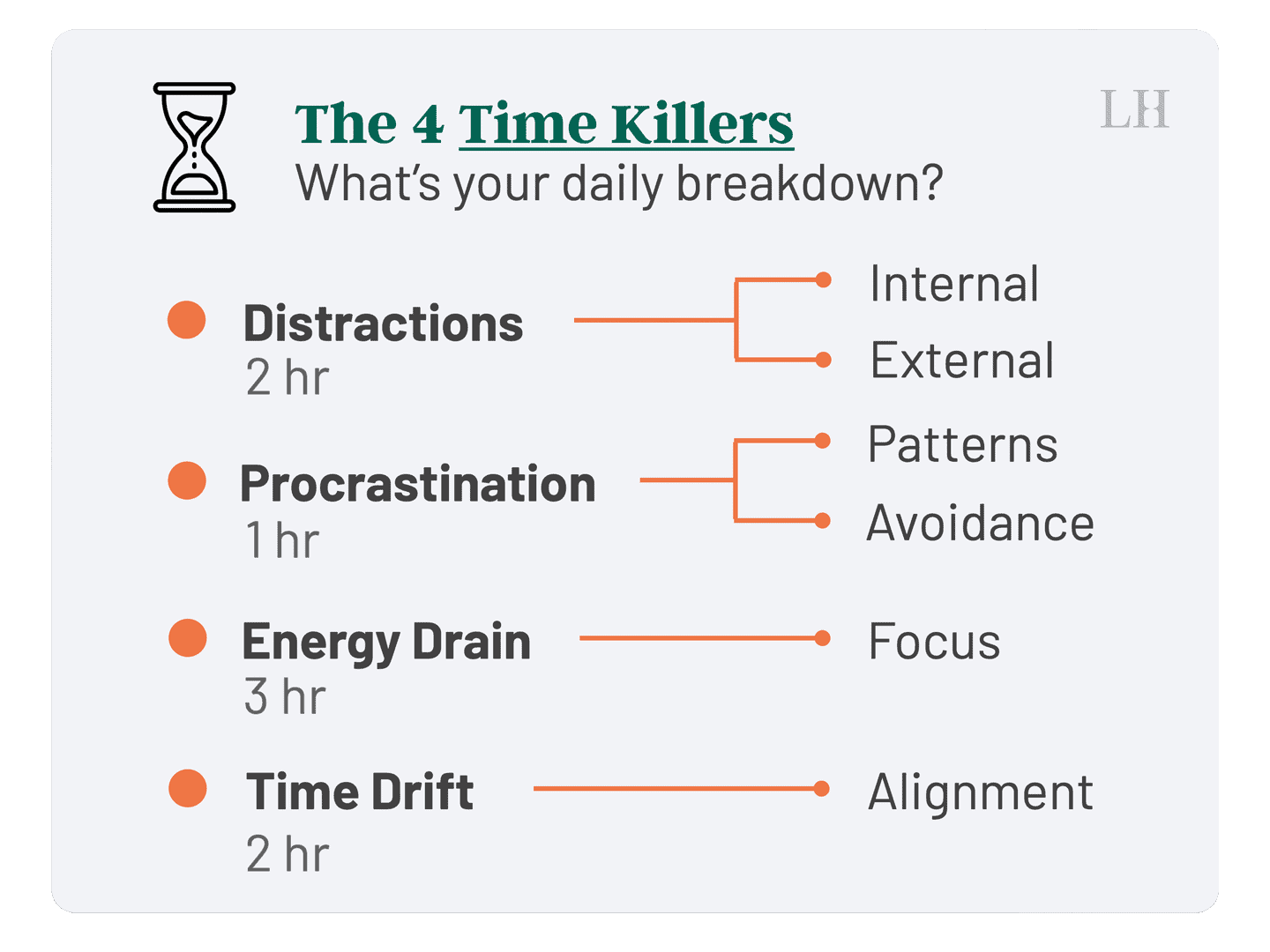
Reclaim Your Time: Conquer the 4 Major Time Wasters
[ad_1]
In our fast-paced, modern world, time is our most precious commodity. We’re constantly juggling responsibilities, chasing dreams, and trying to make the most of every moment. But have you ever felt like your days are slipping away, consumed by activities that don’t truly enrich your life? It’s a common struggle, and the culprit is often hiding in plain sight: time killers.
Time Killers are sneaky saboteurs that rob us of our quality time. They’re the distractions, the procrastination, the lack of direction, and the energy drains that prevent us from living our lives to the fullest. These time thieves can leave us feeling unfulfilled, frustrated, and guilty, wondering where all our precious hours have gone.
But what exactly are time killers, and how can we identify them in our own lives? More importantly, how can we overcome them and reclaim our time for the things that truly matter?
In this article, we’ll dive deep into the concept of time killers and explore practical strategies for defeating them.
We’ll start by defining time killers and introducing a powerful framework called TIME, which breaks down the impact of these productivity vampires into three key areas: Time, Action, and Meaning. By understanding how time killers damage these aspects of our lives, we can develop a clearer picture of what’s holding us back.
Next, we’ll explore the four main categories of time killers: Distractions, Procrastination, Time Drift, and Poor Energy State. We’ll provide examples, examine the root causes, and offer targeted strategies for overcoming each type of time killer.
We’ll also include reflection questions and action steps to help you identify your own time killers and start making tangible changes. By the end, you’ll have a comprehensive toolkit for reclaiming your time and living a more purposeful, fulfilling life.
What Are Time Killers?
Time killers are any activities, habits, or mindsets that consume our precious time without providing value or fulfillment in return. They’re the things that leave us wondering, “Where did the day go?” or feeling like we haven’t accomplished anything meaningful. Time killers can be obvious, like mindlessly scrolling through social media, or more subtle, like attending meetings that lack clear objectives.
But to truly understand time killers, we need a more specific definition. Time killers are anything that hurts one or more of the following three areas: Time, Action, and Meaning.
The TIME Framework
- Time – In this context, Time refers to how rich or scarce your time feels to spend on different things in your life. Time killers create a sense of time poverty, making you feel like there’s never enough time to do what matters most.
- Action – Action is about how busy or active you are in spending your time. Time killers can prevent you from taking action altogether, or they can make your actions ineffective and unproductive.
- Meaning – Meaning refers to how fulfilled or satisfied you feel your time and action is being spent. When a time killer strikes, it doesn’t contribute to your needs or desires. It leads to zero progress or even negative progress, leaving you feeling unfulfilled, frustrated, or guilty.
By breaking down time killers into these three specific areas, we can gain clarity on how they impact our lives. This framework helps us identify the root causes of our time management struggles and develop targeted solutions.
For example, if you find yourself constantly distracted by notifications on your phone, that’s a time killer that primarily affects your Action. It’s preventing you from focusing on the task at hand and making progress. On the other hand, if you’re spending hours on a project that doesn’t align with your goals or values, that’s a time killer that’s draining your Meaning.
The Four Horseman of Time Killers
Time Killer #1: Distractions
Picture this: you’re working on an important project, fully immersed in the task at hand. Suddenly, your phone buzzes with a new notification. You tell yourself you’ll just take a quick peek, but before you know it, you’ve spent 20 minutes scrolling through social media. Sound familiar? That’s the power of distractions.
Distractions are anything that draws your focus or attention away from what you should be doing at the moment. They can be external, like a colleague dropping by your desk for a chat, or internal, like a nagging thought that keeps pulling your mind off task. Common examples include social media notifications, email alerts, background noise, and clutter in your work environment.
Distractions are notorious time killers because they break your concentration and disrupt your flow. Every time you’re pulled away from your work, it takes time and mental energy to refocus and get back on track. Over the course of a day, these little interruptions can add up to hours of lost productivity. Distractions can also lead to errors and reduced quality of work, as you’re not giving your full attention to the task at hand.
To overcome distractions, try creating a distraction-free environment by decluttering your workspace and using tools like website blockers or noise-canceling headphones. Turn off notifications on your devices and schedule specific times to check emails and messages. You can also practice the Pomodoro Technique, working in focused 25-minute intervals with short breaks in between. And don’t be afraid to say no to unnecessary meetings or conversations that disrupt your workflow.
Time Killer #2: Procrastination
Procrastination is the act of delaying or postponing tasks, often despite knowing that it will have negative consequences. It’s putting off that big project until the last minute, or choosing to watch one more episode on Netflix instead of tackling your to-do list. Procrastination can take many forms, from endless planning and research to simply avoiding the task altogether.
Many of us procrastinate from time to time, but when it becomes a habit, it can be a major time killer. Procrastination often stems from deeper psychological factors, such as fear of failure, perfectionism, or lack of motivation. When a task feels too overwhelming or we’re not confident in our abilities, it’s easy to put it off in favor of something more comfortable. Procrastination can also be a symptom of poor time management skills or an inability to prioritize tasks effectively.
To beat procrastination, try breaking large projects into smaller, manageable steps and focus on completing one step at a time. Use positive self-talk and visualization techniques to build confidence and motivation. Create accountability by sharing your goals with a friend or colleague and checking in regularly on your progress. And remember, done is better than perfect. Embrace imperfection and take action, even if it’s not flawless.
Time Killer #3: Time Drift
We’ve covered distractions and procrastination, two common time killers that actively pull us away from our goals. But now, let’s talk about a more sinister culprit: Time Drift.
Time Drift is a sneaky time killer because it’s not as obvious or in-your-face as distractions or procrastination. It happens when you don’t have a clear direction or focus, and you’re just “going with the flow” – except the flow isn’t taking you anywhere meaningful.
When you’re in a state of Time Drift, your actions become reactive. You do whatever comes to mind or whatever grabs your attention next. It’s like being carried along by a current, with no specific destination in sight. The tricky part about Time Drift is that you might feel like you’re being busy and active in the moment. You’re doing things, answering emails, attending meetings, but there’s no real sense of purpose or progress.
And then, suddenly, you’ll snap out of it and wonder, “What did I actually accomplish today? Where did my entire morning/afternoon/evening go? Why do I feel like I’ve wasted so much valuable time?”
You’ll try to recall all the “things” you did, but you’ll likely feel like none of it amounted to anything substantial. The time is gone, and you can’t get it back. That’s why Time Drift is such a sinister time killer – you often only realize you’ve lost time after the fact, like discovering you’ve been pickpocketed hours later.
To combat Time Drift, set clear goals and intentions for your day, week, and overall trajectory. Use time-blocking techniques to schedule focused work sessions on your most important tasks. Regularly check in with yourself to ensure you’re staying on track and making meaningful progress. Create a visual roadmap of your goals, breaking them down into smaller milestones to keep you motivated and aligned.
Remember, Time Drift thrives on lack of clarity and direction. By setting clear intentions, focusing on your priorities, and regularly assessing your progress, you can steer yourself out of the drift and into purposeful, meaningful action.Time
Killer #4: Poor Energy State
Your energy state, both mental and physical, plays a crucial role in your ability to manage time effectively and stay productive. When you’re feeling sharp, focused, and well-rested, you’re more likely to tackle challenges head-on and make the most of your time. On the other hand, when you’re stressed, fatigued, or mentally drained, even simple tasks can feel like a struggle.
Many of the same factors that kill time can also drain your energy. Poor sleep habits, unhealthy diet choices, lack of exercise, and chronic stress are all common culprits. Multitasking and overcommitting can also leave you feeling scattered and depleted, as you’re constantly switching gears and running on fumes.
To optimize your energy levels, prioritize quality sleep by creating a consistent sleep schedule and bedtime routine. Fuel your body with nutrient-rich foods and stay hydrated throughout the day. Incorporate regular exercise into your routine, even if it’s just a brief walk or stretch break. Practice stress-management techniques like deep breathing, meditation, or journaling. And don’t forget to take regular breaks to recharge and avoid burnout, especially during mentally taxing tasks.
By understanding and addressing these four main categories of time killers, you’ll be well on your way to reclaiming your time and energy for the things that matter most. In the next section, we’ll dive into reflection questions and action steps to help you start making tangible changes in your own life.
Questions for Reflection
We’ve explored the concept of time killers and how they can sabotage our precious moments. We’ve learned that time killers damage three key areas of our lives: Time, Action, and Meaning. When our time feels scarce, our actions become ineffective, and our sense of fulfillment diminishes, it’s a clear sign that time killers are at work.
We’ve also delved into the four main categories of time killers: Distractions, Procrastination, Time Drift, and Your Energy State. Each of these culprits can steal our time in different ways, but by understanding their tactics and implementing targeted strategies, we can reclaim control.

Now, it’s time to turn the spotlight on you. Take a moment to reflect on your own experience with time killers.
- Which area do they impact most in your life?
- Is it your sense of time abundance, your ability to take effective action, or your overall sense of meaning and fulfillment?
Next, consider which category of time killers you struggle with most.
- Do you find yourself constantly battling distractions
- Putting things off due to procrastination
- Drifting through your days without clear direction
- Or struggling with low energy and focus?
Once you’ve identified your primary time killer, choose one specific instance to focus on this week. It might be a particular distraction you want to eliminate, a procrastination habit you want to break, a goal you want to clarify, or an energy-draining behavior you want to change.
Find Your Biggest Time Killer
You’ve already taken a crucial first step by learning about the four main time killers and strategies to overcome them. Now, it’s time to dive deeper and discover your unique time management challenges.
Our free ‘Find Your Biggest Time Killer Assessment’ is designed to provide personalized insights and actionable steps based on your specific situation. In just a few minutes, you’ll gain clarity on your primary time waster and receive a custom report filled with practical tips to help you reclaim your time and boost your productivity.
Remember, the goal isn’t to conquer every time killer overnight. It’s about making steady, incremental progress. Start small, celebrate your wins, and keep building momentum. Each step you take, no matter how tiny, is a victory in the battle against time killers.
As you embark on this journey, know that you’re not alone. We all struggle with time killers, but by bringing awareness to them and committing to change, we can create more time, take more effective action, and experience greater meaning in our lives.
[ad_2]
Source link



